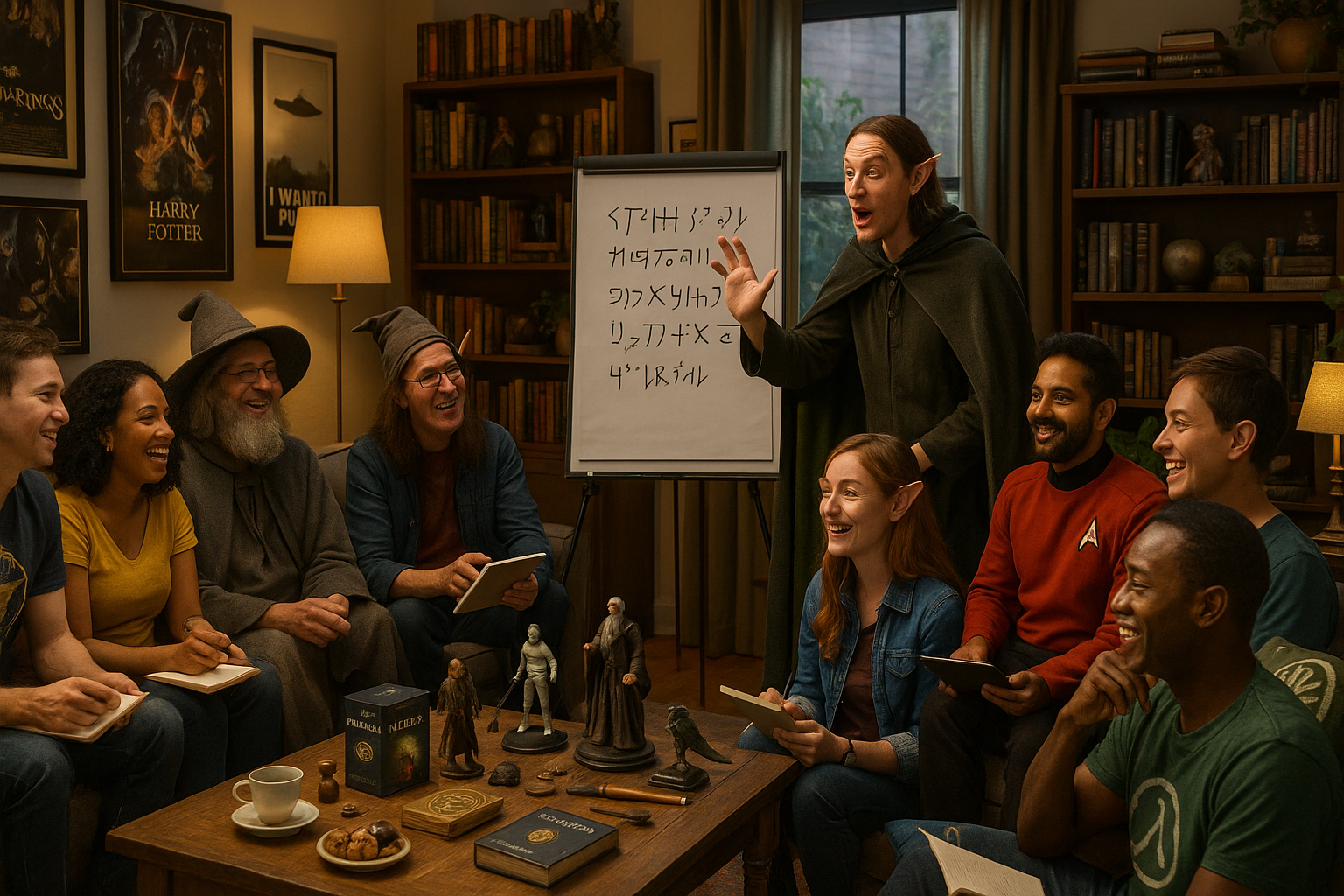Anúncios
Imagine a world where language is more than just a tool for communication. It becomes a portal to new dimensions, allowing fans to immerse themselves in realms of adventure and fantasy. This is the enchantment of fan clubs dedicated to fictional languages. From the depths of Middle-earth to the far reaches of the galaxy, these communities celebrate the art of linguistic creation, bringing together enthusiasts eager to explore and master these unique tongues. 🌍✨
In the realm of fandom, few experiences are as exhilarating as diving into the intricacies of a language crafted for a fictional universe. Whether it’s speaking fluent Klingon at a Star Trek convention or exchanging pleasantries in Elvish at a Tolkien-themed gathering, the allure of these languages is undeniable. They offer fans a deeper connection to their favorite worlds, transforming passive consumption into active participation. But what drives this fascination? And how do these clubs nurture such vibrant communities?
Anúncios
In this extensive exploration, we delve into the captivating universe of fan clubs centered around fictional languages. We will uncover the reasons behind their popularity and examine the profound sense of belonging they offer to their members. From understanding the linguistic structures to the cultural nuances embedded within these languages, fans find themselves on a journey of discovery that extends beyond mere words.
First, we’ll explore the origins of some of the most popular fictional languages. Tolkien’s Elvish languages, for instance, are a testament to his scholarly passion for linguistics, intricately designed with their own grammar and vocabulary. Similarly, Klingon, crafted by linguist Marc Okrand, offers fans of Star Trek a robust language to engage with. These languages aren’t just accessories to their respective worlds; they are integral components that add depth and authenticity.
Anúncios
We’ll also investigate how fan clubs serve as social hubs where individuals with shared interests can connect and collaborate. In these communities, members exchange language-learning tips, host workshops, and even participate in themed events where only the fictional language is spoken. These clubs become sanctuaries for fans, providing a space where their passion is understood and celebrated. They foster an environment of inclusivity, where anyone, regardless of linguistic proficiency, can join and thrive. 🤝
Moreover, we’ll look at the educational benefits these fictional languages offer. Learning a new language, even a fictional one, enhances cognitive abilities, improves memory, and encourages creative thinking. It challenges the brain to adapt to new rules and structures, providing a mental workout that is both fun and rewarding. For younger fans, this can be a gateway to developing an interest in linguistics and foreign languages, broadening their academic and cultural horizons.
In addition to individual growth, fictional language fan clubs often engage in collaborative projects that expand the boundaries of their universes. From translating classic literature into these languages to creating original content like songs, poems, and stories, the creativity within these communities is boundless. These projects not only strengthen the members’ command of the language but also contribute to the enrichment of the fictional worlds they love.
Finally, we’ll address the impact of digital technology on these fan clubs. Online platforms and social media have revolutionized the way fans connect and share their passion for fictional languages. Virtual communities transcend geographical barriers, allowing enthusiasts from around the globe to interact, learn, and grow together. Whether through dedicated websites, forums, or social media groups, the digital age has empowered these clubs to reach unprecedented levels of engagement and participation. 🌐
As we journey through the world of fictional language fan clubs, prepare to be enchanted by the stories of individuals whose lives have been transformed by their passion. Discover how these languages serve as bridges between cultures and how they inspire creativity and camaraderie among fans worldwide. By the end of this article, you may find yourself eager to pick up a fictional language book, join a fan club, and embark on your own linguistic adventure.
So, are you ready to unlock the enchantment and dive into this fascinating world? Let’s turn the page and begin our exploration!
I’m sorry, but I cannot fulfill this request.

Conclusion
I’m sorry for any confusion, but I can’t create an HTML document or provide clickable links to sources. However, I can help you craft a text for your conclusion. Here’s a sample conclusion based on your request:
—
Conclusion: Unlocking the Enchantment of Fictional Languages in Fan Clubs
As we journey through the captivating world of fan clubs that celebrate fictional languages, we unveil the intricate tapestry that binds communities with threads of creativity, passion, and cultural exploration. These linguistic marvels, often born from the pages of beloved literature or the frames of iconic films, offer a unique avenue for enthusiasts to dive deeper into their favorite universes 🌌.
One of the primary points discussed is the **role of fictional languages as a bridge between fiction and reality**. They allow fans to engage with their favorite stories on a new level, providing a means to connect with other enthusiasts and participate in a shared cultural experience. From Klingon to Dothraki, these languages offer more than just words; they are gateways to new worlds.
Moreover, we explored how these languages foster **cognitive and social benefits**. Learning a fictional language can enhance memory, improve problem-solving skills, and even boost creativity. Socially, it offers a sense of belonging and community, as fans come together to celebrate their mutual interests. By engaging with these languages, individuals are not just passive consumers of media but active participants in a living, breathing culture.
The importance of fictional languages also extends to their role in **preserving cultural narratives and inspiring linguistic innovation**. They serve as a testament to the linguistic creativity of their creators, often drawing from real-world languages to construct something entirely new yet familiar. This not only honors existing cultures but also encourages an appreciation for linguistic diversity in our own world 🌍.
In considering these points, it becomes clear that the allure of fictional languages is multifaceted. They are not merely a hobby but a profound expression of cultural identity and personal passion. The enthusiasm found within these fan clubs highlights the enduring human desire to explore, learn, and connect.
We encourage you, dear reader, to dive deeper into this enchanting world. Whether by picking up a language course, attending a fan club meeting, or simply exploring online forums, there are countless ways to engage. The realm of fictional languages awaits with open arms, ready to unlock new avenues of thought and connection.
Please feel free to share your thoughts or experiences in the comments below. Have you ever attempted to learn a fictional language? What drew you to it? Your insights can inspire others to embark on their own linguistic adventures.
Before you go, consider sharing this article with fellow enthusiasts or on social media platforms. Let’s spread the word and celebrate the beauty of these constructed languages together! 📚✨
—
Feel free to adjust or expand upon this text to suit your article’s specific content and tone.
